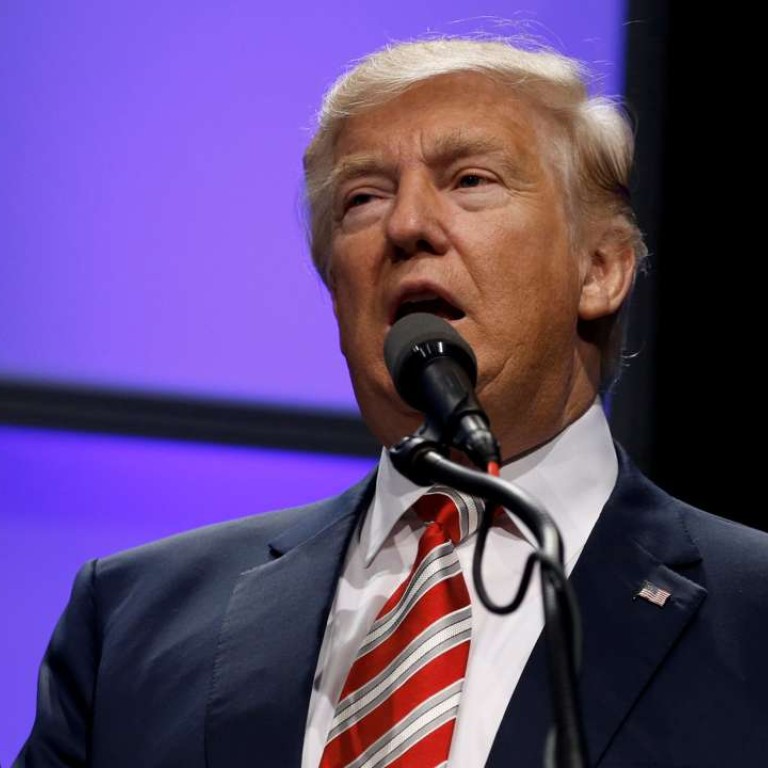
Trump may tower over Asia, but he will have to work with China
Trump’s spending plans will divert greenbacks destined for Asia to the US, while driving up the global price of servicing dollar-debt
Trump towers over Asia after his election win, but will have to work with China. Despite the president-elect’s campaign rhetoric targeting supposedly unfair competition from China, the world’s second-largest economy, the national interests of the United States dictate the need for accommodation with Beijing.
Trump’s anti-China rhetoric should prove overblown. Deals will have to be cut.
It was surely no coincidence that just a day after Donald Trump won the White House, one of his senior advisors, James Woolsey, writing, significantly, in the South China Morning Post and not a US newspaper, adopted a more positive approach towards Beijing than might have been expected based on Trump’s on-the-stump anti-China rhetoric.
Could it be that Donald Trump, author of “The Art of the Deal,” proves to be someone who, unexpectedly, can forge a good working relationship with Beijing? As a starting point, Trump’s rejection of the Obama administration’s pursuance of a free trade Trans-Pacific Partnership that excluded China might play well in Beijing.
That doesn’t mean that the road ahead is going to be easy. Trump’s voters will expect the new US president to follow through on his promises to reinvigorate the US manufacturing base, but that needs to be achieved without inciting a trade war with China that would surely hit the US economy too.
If nothing else, US policymakers will be very conscious of the fact that barriers to trade, adopted by President Hoover and enshrined in the 1930 Smoot-Hawley Act, exacerbated, even if they did not create, the conditions in which that decade’s Great Depression gestated.
US policymakers will be conscious that barriers to trade exacerbated, even if they did not create, the conditions in which the [1930s] Great Depression gestated
But if the Trump administration does decide to play hardball on certain issues, it might be other nations in Asia that suffer, not China.
Business process outsourcing (BPO) and overseas Filipino worker (OFW) remittances are a key component of the Philippines’ economy, a point made by Singapore-based analysts at Japanese bank BTMU on Thursday.
If the Trump administration clamps down on outsourcing and immigration, it will hit the Philippines’ economy and undoubtedly test President Duterte’s resolve not to swear. “[The Philippines’ central bank] estimates that around 70 per cent of BPO revenue stems from the US,” BTMU wrote.
A Trump-led clampdown on outsourcing would also have negative ramifications for India’s economy at the very time when China’s growing economic footprint in Pakistan, as part of the One Belt One Road policy, might ordinarily point towards a closer relationship between Delhi and Washington.
Washington will effectively steal Asia’s growth potential to finance its own plans to expand US gross domestic product
Yet in reality the elephant in the room is actually the fact that, according to the non-partisan US-based Committee for a Responsible Budget, Trump’s spending plans could add $5.3 trillion to the US’ national debt over the next decade.
Setting aside the fact that Trump’s loose fiscal policy settings will in all likelihood require the offset of tighter monetary policy in the form of higher US interest rates that will make it more expensive for the world to service its dollar-denominated debt, the fact is that if Uncle Sam wants dollars, he’ll get them. Only the price has to be negotiated.
And as the US government upscales its requirement for capital to fund Trump’s infrastructure projects, both through borrowing more dollars in the international market or encouraging US corporates to repatriate money held offshore, the greenbacks that end up in Uncle Sam’s coffers will come from somewhere else.
Capital will be diverted into the United States and away from other regions such as Asia. Washington will effectively steal Asia’s growth potential to finance its own plans to expand US gross domestic product.
Some countries around the world may find the process even more painful.
The Latin American debt crisis of the early 1980s, where countries such as Mexico found it impossible to service their dollar-debt obligations, was, in part, a consequence of the increase in US government borrowing by President Reagan combined with the then Federal Reserve chief Paul Volcker’s ramping up of interest rates.
Current Fed chief Janet Yellen isn’t faced with the same inflationary pressures that Volcker had to defeat, but to some degree Trump’s spending plans do bear a passing resemblance to those of Ronald Reagan, and the world does remain addicted to dollar-denominated debt.
Campaign trail rhetoric that aligned a Trump Presidency with the United States adopting a more protectionist agenda on trade might yet prove exaggerated.
But his spending plans to kick-start US GDP growth will absorb greenbacks that might otherwise have flowed into Asia, while simultaneously driving up the global price of servicing dollar-debt. Trump will still tower economically over Asia as a whole.

